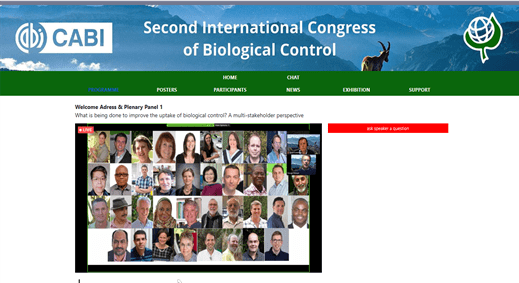The virtual 2021 congress was jointly organised by the Centre for Agriculture and Bioscience International (CABI) and the International Organisation for Biological Control (IOBC) in Davos, Switzerland.
The event opened with welcome notes from Martin Hill, President of IOBC Global and Professor of Rhodes University, Grahamstown, South Africa, and Ulli Kuhlmann, Executive Director & Local Organiser of ICBC, CABI, Delémont, Switzerland.
The keynote lecture was presented by George Heimpel, former President of IOBC Global, who discussed the urgent need for improving the uptake of biological control in agriculture for pest and disease control. He said this could only be achieved through multi- and interdisciplinary research approaches.
The congress’s 26 sessions, three panel discussions and poster sessions covered a range of issues including climate change, genetic improvement of biological control agents, ecological interactions among biological control agents, challenges and risks associated with biological control, and the development of decision support systems to bolster the use of biological control agents. The panel discussions provided great insights on some important future avenues for advancing research on biological control.
The plenary speaker, Alessandra Moccia, Director of Regulatory Affairs, Suterra and Semiochemical Professional Group Chair of International Biocontrol Manufacturers Associations (IBMA) reflected on the global regulatory policies and registration procedures for biocontrol products. Jonathan Shoham, Senior Consultant Analyst, IHS Markit presented an in-depth analysis on the landscape for biological control agents and their current market status, demonstrating the tremendous future potential of biocontrol products in agriculture.
Among the scientific sessions, Dr Belinda Luke, Global Team Leader, PlantWise Plus from CHAP partner CABI delivered a session on “BioSuccess – an app to help determine the effects of climate change on the efficacy of a biopesticide”. In another session, Kris Wyckhuys, Chief Executive Officer at Chrysalis Consulting discussed the importance of a participatory approach on knowledge sharing for bridging social and natural sciences to assess the uptake, public awareness and the economic impact of biological control.
The week-long congress was highly interdisciplinary. It brought together policymakers, scientists, young researchers, and practitioners from all parts of the world working on different disciplines of biological control under one roof to facilitate networking for open science and increase the reach of biological control solutions worldwide.
If you have any questions about CHAP or are interested in working with us on a specific project, then please send us an email using the enquiries form at the bottom of our homepage.












